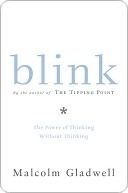More on this book
Community
Kindle Notes & Highlights
A person watching a silent two-second video clip of a teacher he or she has never met will reach conclusions about how good that teacher is that are very similar to those of a student who has sat in the teacher’s class for an entire semester. That’s the power of our adaptive unconscious.
having someone you love express contempt toward you is so stressful that it begins to affect the functioning of your immune system.
Our world requires that decisions be sourced and footnoted, and if we say how we feel, we must also be prepared to elaborate on why we feel that way.
In short, when you write down your thoughts, your chances of having the flash of insight you need in order to come up with a solution are significantly impaired — just as describing the face of your waitress made you unable to pick her out of a police lineup.
In the act of tearing something apart, you lose its meaning.”
truly successful decision making relies on a balance between deliberate and instinctive thinking.
If you get too caught up in the production of information, you drown in the data.”
We think of the face as the residue of emotion. What this research showed, though, is that the process works in the opposite direction as well.
We have come to confuse information with understanding.
The key to good decision making is not knowledge. It is understanding. We are swimming in the former. We are desperately lacking in the latter.
“When making a decision of minor importance, I have always found it advantageous to consider all the pros and cons. In vital matters, however, such as the choice of a mate or a profession, the decision should come from the unconscious, from somewhere within ourselves. In the important decisions of personal life, we should be governed, I think, by the deep inner needs of our nature.”


